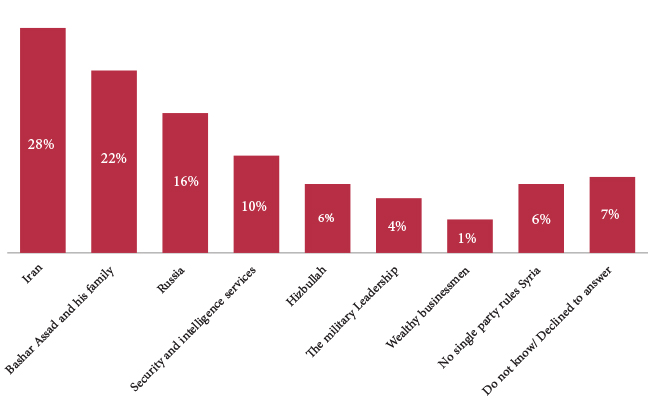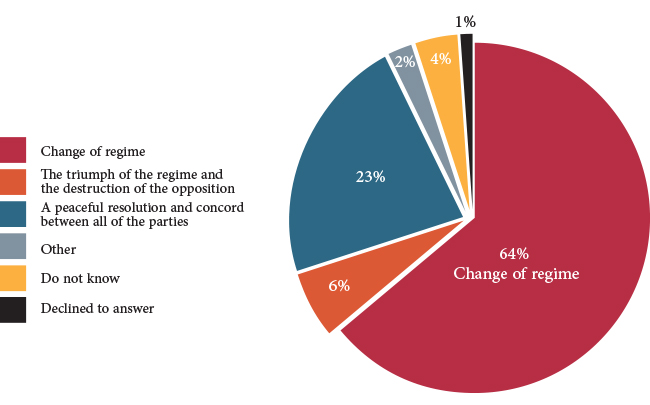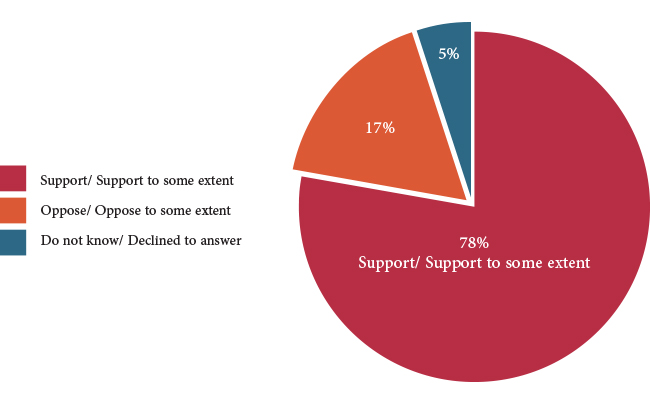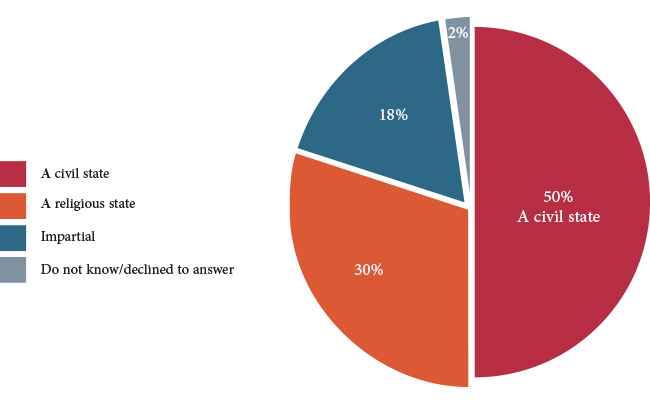The findings indicate that the overwhelming majority of Syrians abroad, at a level of greater than 75%, view the June 3 elections as unrepresentative of the Syrian people. Seemingly, according to this argument, only regime supporters would have taken part in the elections, suggesting that the results were a foregone conclusion. Further, the results show a widely held view among the respondents that the regime’s determination to hold the elections implies an increased mandate for it to continue killing the Syrian people and inflicting violence on them, prolonging and intensifying the crisis. A near-consensus of 75% of the respondents indicated their lack of confidence in the main institutions of the Syrian regime: the military, the People’s Assembly (Parliament), the police, the judiciary, the cabinet of ministers, regional governors, and Bashar al-Assad.
When asked to identify the two groups and/or states with the greatest control over decision-making in Syria today, the party most frequently identified by respondents was Iran, at 28%. This was followed by “Bashar al-Assad and his family,” identified by 22% of respondents, and then Russia, identified by 16% of respondents. Notably, only 4% of respondents to this question selected the military as one of the two parties with the greatest influence over the turn of events in Syria. Six percent of respondents who felt that “no single party rules Syria today”.

Figure 2: Respondents' designations of the two parties most influential in Syria—scores for each party combined for first and second-most important.
A majority of the respondents, at 64%, expressed the opinion that the ideal solution to the present Syrian crisis would come through a change of the present regime. This contrasts with a mere 6% of respondents who viewed the triumph of the regime and the destruction of the opposition as leading to the ideal solution. Meanwhile, 23% of respondents expressed that the ideal solution to the Syrian crisis would come through a peaceful, negotiated conciliation between all parties to the conflict.

Figure 3: Respondents' proposed ideal solutions to the Syrian crisis
Similarly, an overwhelming majority of Syrian respondents, at 78%, agreed with the statement: “It would be better for Syria today if Bashar al-Assad abdicated power.” A number of reasons were cited for this response, including: “his culpability for massacres, murder, displacement, and oppression against the Syrian people”; “he is the main culprit behind the state of affairs as they stand at present in Syria”; and “his abdication would lead to a solution to the present crisis in Syria”. This contrasts with 17% of respondents who opposed al-Assad’s resignation. In general, this latter group justified their positions either because they believed al-Assad to be the best and strongest possible leader for Syria, or because they believed that he was the most capable of preserving the country.

Figure 3: Respondents’ agreement/disagreement with the expression “It would be better for Syria today if Bashar al-Assad abdicated power.”
Three years after the beginning of the revolution/crisis in Syria, a majority of 60% of respondents indicated their opposition to the regime and a closer affinity to the opposition. Only 13% of respondents indicated that they felt a closer affinity to the regime than to the opposition. Respondents were also asked about their attitudes toward the regime and the opposition during the first six months of the revolution (from March to September 2011).
Only 52% of respondents indicated that they had been more supportive of the protestors in comparison to the regime during the first six months of the revolution (from March to September 2011), while 19% of the respondents indicated that they had been more sympathetic to the regime than to the protestors during that same period.
A comparison of these results demonstrates very clearly that disapproval of the Syrian regime has intensified in the three years since the outbreak of the revolution. Support for the opposition, meanwhile, is at a higher level now than during the first six months of the revolution. Such statistically significant shifts in support for the regime or the opposition indicate that the regime's policies since March, 2011 have not served to increase its popular base.
|
|
During the first six months of the revolution
|
After three years of the revolution (at time of survey)
|
|
Closer to (“more sympathetic”) the protestors and opposed to the regime
|
52%
|
60%
|
|
Closer to (“more sympathetic”) the regime and opposed to the protestors
|
19%
|
13%
|
|
Opposed to both sides
|
(Not asked)
|
11%
|
|
Do not have/did not have a firm opinion (neutral)
|
28%
|
15%
|
|
Do not know/declined to answer
|
1%
|
1%
|
When asked to describe their preference for the nature of the state to rule over a future Syria, 50% of respondents indicated that they would like to see a civil state, compared with 30% who indicated their support for a religious state in Syria. Another 18% of respondents expressed no preference for either of these two choices.

Figure 5: Respondents' preferences for the nature of a state in post-conflict Syria.
A more complete report of these findings reported here can be found here.
To read the Arabic version of the full report, click here.